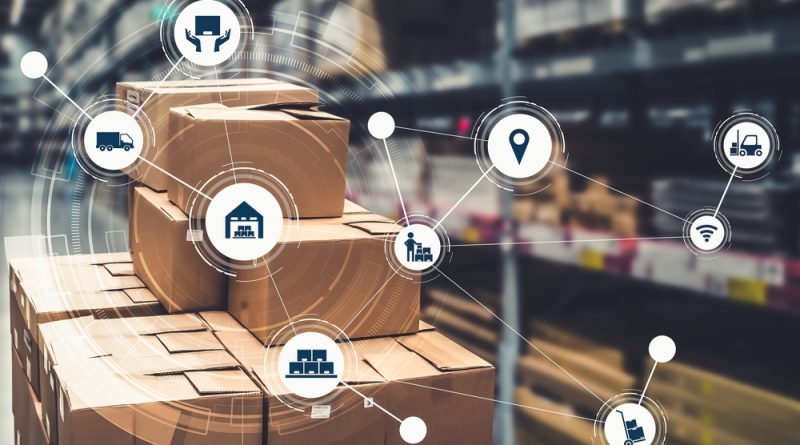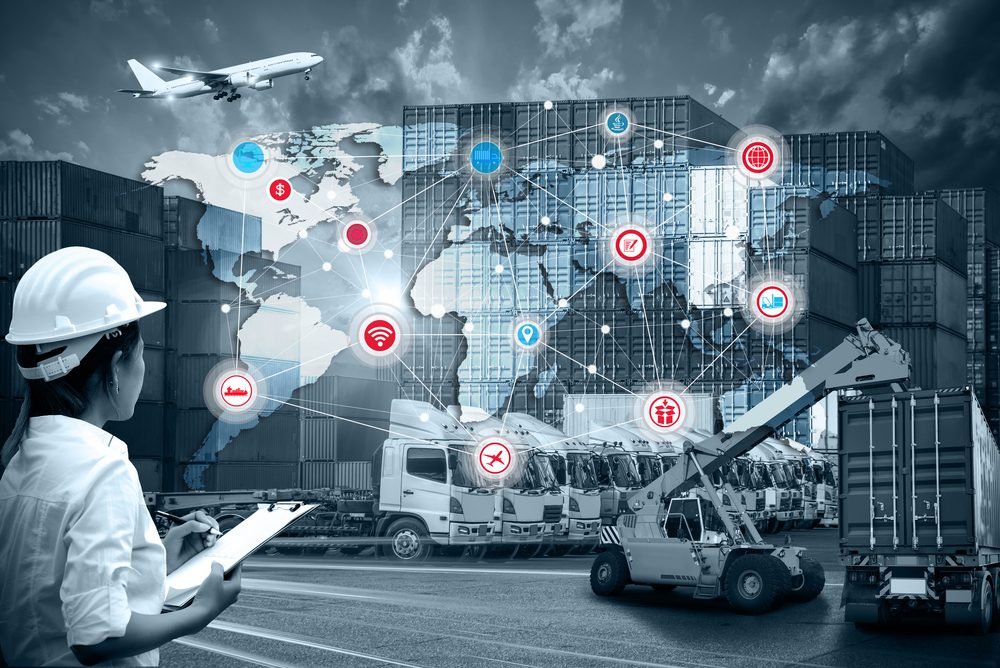Artificial Intelligence (AI) is used in supply chain and logistics to improve delivery accuracy and speed, optimize routes and schedules, and increase efficiency. AI analyzes data on delivery locations, inventory levels, and other factors to optimize logistics operations.
AI also has future potential in areas such as autonomous vehicles and drones for faster and flexible deliveries. Generative AI in supply chain generates insights and strategies based on vast amounts of supply chain data.

Credit: scw-mag.com
Introduction To Ai In Supply Chain And Logistics
AI in supply chain and logistics is revolutionizing the industry by improving delivery accuracy and speed. With the help of AI-powered optimization, logistics companies can analyze data and optimize delivery routes and schedules, leading to reduced errors, increased efficiency, and improved overall performance.
The future of AI in logistics holds even more potential, with autonomous vehicles and drones promising to transform the industry further.
What Is Ai And Its Role In Supply Chain And Logistics
Artificial Intelligence (AI) is a cutting-edge technology that enables machines to perform tasks that traditionally required human intelligence. In the context of supply chain and logistics, AI plays a crucial role in optimizing operations and improving overall efficiency.
Benefits Of Using Ai In Supply Chain And Logistics
There are several benefits to integrating AI into supply chain and logistics operations:
- Improved accuracy and speed: AI-powered algorithms can analyze vast amounts of data, allowing for more accurate demand forecasting, route optimization, and inventory management. This leads to faster and more efficient operations.
- Reduced errors and increased efficiency: AI can automate repetitive tasks, reducing the likelihood of human errors. This, in turn, improves overall efficiency and productivity.
- Enhanced decision-making: AI algorithms can process large volumes of data in real-time, enabling supply chain managers to make more informed decisions based on accurate, up-to-date information.
Current Applications Of Ai In Supply Chain And Logistics
AI is already revolutionizing supply chain and logistics in various ways:
- Route optimization: AI can analyze factors such as traffic patterns, weather conditions, and delivery locations to optimize delivery routes, reduce fuel consumption, and minimize delivery time.
- Inventory management: AI-powered systems can predict future demand, enabling companies to optimize inventory levels and reduce the risk of stockouts or excess inventory.
- Supply chain visibility: AI can provide real-time tracking and monitoring of goods throughout the supply chain, allowing for better visibility and control over the entire process.
- Automated warehouse operations: AI-powered robots can automate tasks such as picking and packing, improving warehouse efficiency and reducing labor costs.
In conclusion, AI is transforming the supply chain and logistics industry by improving accuracy, increasing efficiency, and enabling smarter decision-making. By leveraging the power of AI, companies can optimize their operations and stay ahead in the competitive market.
Future Of Ai In Supply Chain And Logistics
Autonomous vehicles and drones are expected to play a pivotal role in the future of supply chain and logistics. These innovative technologies have the potential to revolutionize the way goods are transported, offering increased efficiency, cost savings, and reduced environmental impact.
Self-driving trucks, equipped with AI-powered sensors and cameras, can autonomously navigate through traffic, optimizing delivery routes and minimizing fuel consumption. This technology eliminates the need for human drivers, reducing labor costs and ensuring round-the-clock operation.
Drones, on the other hand, provide a unique solution for last-mile delivery. With their ability to maneuver quickly in congested urban areas, drones can facilitate faster and more precise deliveries. They can reach remote locations, bypass traffic, and overcome geographical barriers, ensuring timely delivery of goods.
The combination of autonomous vehicles and drones in the supply chain and logistics industry holds immense potential. Companies like Amazon and UPS have already started experimenting with drone deliveries in select areas, showcasing the future possibilities of these technologies.
Generative AI, also known as machine learning or deep learning, has the power to transform supply chain and logistics operations. By analyzing large volumes of data, generative AI algorithms can identify patterns, make predictions, and generate solutions to complex problems.
For example, generative AI can optimize inventory management by analyzing historical sales data, market trends, and other variables. It can accurately predict demand patterns and recommend the optimal stocking levels, minimizing waste and inventory holding costs.
Furthermore, generative AI can enhance demand forecasting, enabling companies to better anticipate customer needs and adjust their production schedules accordingly. This technology can also optimize warehouse operations, improving order picking processes, and reducing fulfillment times.
With generative AI, supply chain and logistics professionals can make data-driven decisions, improve efficiency, and gain a competitive edge in the market.
The integration of AI into the supply chain and logistics industry has a profound impact on professionals in this field. While some may have concerns about job security, AI actually enhances their roles and capabilities, transforming them into strategic decision-makers.
AI-powered technologies automate repetitive and time-consuming tasks, such as data entry and analysis, allowing supply chain professionals to focus on more meaningful activities. They can dedicate their time to strategic planning, process optimization, and relationship management.
AI provides professionals with real-time insights and predictive analytics, enabling them to optimize supply chain operations, proactively identify bottlenecks, and mitigate risks. It empowers them to make data-backed decisions, improving operational efficiency and customer satisfaction.
Furthermore, AI enhances collaboration and communication within the supply chain ecosystem. It enables seamless integration of data across various stakeholders, facilitating transparency and coordination.
In conclusion, the future of AI in supply chain and logistics is filled with exciting possibilities. With advancements in autonomous vehicles and drones, generative AI algorithms, and the impact on supply chain professionals, AI is set to revolutionize the industry, driving efficiency, cost savings, and customer satisfaction.
Challenges And Concerns Of Ai In Supply Chain And Logistics
Artificial Intelligence (AI) has rapidly gained popularity in the supply chain and logistics industry. Its ability to automate repetitive tasks, optimize operations, and make data-driven decisions has made it an attractive solution for many organizations. However, with the integration of AI, there are several challenges and concerns that need to be addressed. These challenges range from reluctance to invest in new technology to ethical considerations in AI adoption. Let’s take a closer look at some of these challenges and concerns:
Reluctance To Invest In New Technology
One of the main challenges with AI adoption in the supply chain and logistics industry is the reluctance to invest in new technology. Many organizations may be hesitant to allocate resources towards implementing AI solutions due to concerns about the cost and potential disruptions to existing processes. Additionally, there may be a lack of awareness or understanding about the potential benefits that AI can bring to the supply chain and logistics operations.
Possible Replacement Of Supply Chain Professionals
Another concern surrounding AI in supply chain and logistics is the possible replacement of supply chain professionals. As AI technology progresses, there is a fear that certain tasks and roles traditionally performed by humans may be automated, leading to job displacement. While AI can enhance efficiency and productivity, it is essential to find a balance between leveraging AI capabilities and preserving human expertise and decision-making. Organizations need to identify areas where AI can supplement human skills rather than replacing them.
Ethical Considerations In Ai Adoption
When adopting AI in supply chain and logistics, ethical considerations need to be taken into account. AI algorithms and models are only as good as the data they are trained on. There is a concern that biased or incomplete data could lead to biased decision-making and outcomes. It is crucial to ensure that AI systems are transparent, fair, and accountable. Organizations must establish ethical guidelines and practices for AI adoption, including data privacy, security, and responsible use of AI technology.
Frequently Asked Questions For Artificial Intelligence (ai) In Supply Chain And Logistics
How Is Ai Used In Supply Chain And Logistics?
AI is used in supply chain and logistics to improve delivery accuracy and speed. It optimizes delivery routes and schedules, reducing errors, increasing speed, and improving efficiency. AI also has future potential in autonomous vehicles and drones, which promise to transform logistics by reducing costs and enabling faster deliveries.
Generative AI in the supply chain produces insights like optimized route maps and demand forecasts. AI empowers supply chain professionals, rather than replacing them.
What Is The Future Of Ai In Logistics?
The future of AI in logistics is promising. AI can optimize delivery routes and schedules, improving accuracy and efficiency. It also has the potential to revolutionize logistics with autonomous vehicles and drones, reducing labor costs and enabling faster, flexible deliveries.
Generative AI in supply chain can provide insights for optimized route maps, demand forecasts, and supplier evaluation reports. AI empowers supply chain professionals rather than replacing them.
What Is Generative Ai In Logistics And Supply Chain?
Generative AI in logistics and supply chain refers to AI systems that analyze vast amounts of supply chain data and generate insights like optimized route maps, demand forecasts, and supplier evaluation reports. It helps improve efficiency and decision-making in the supply chain.
Will Supply Chain Be Replaced By Ai?
AI will not replace the supply chain but rather empower supply chain professionals. AI can help in optimizing delivery routes and schedules, improving efficiency, and increasing speed and accuracy in logistics and delivery. The future of AI in logistics holds potential in areas like autonomous vehicles and drones, enabling faster and flexible deliveries.
Generative AI can provide insights such as optimized route maps, demand forecasts, and supplier evaluation reports in the supply chain.
Conclusion
AI in supply chain and logistics is revolutionizing the industry by improving delivery accuracy and speed. With AI-powered optimization, companies can analyze data to optimize routes and schedules, reducing errors and increasing efficiency. The future potential of AI in logistics includes autonomous vehicles and drones, which promise flexible and faster deliveries.
Generative AI in supply chain provides valuable insights such as optimized route maps and demand forecasts. It’s important to note that while AI empowers supply chain professionals, it doesn’t replace them. Embracing AI technology can greatly enhance the efficiency and effectiveness of supply chain and logistics operations.





